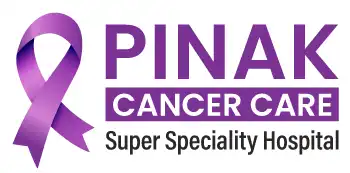
Thyroid cancer is one of the most common endocrine malignancies affecting the thyroid gland. This comprehensive guide is designed for patients seeking expert insights into thyroid cancer—from understanding its symptoms and causes to exploring diagnosis and treatment options. Early detection and proper treatment are essential, and with guidance from expert oncologists like Dr. Pankaj Singh at Pinak Cancer Care, you can navigate your care confidently.
Introduction to Thyroid Cancer
Thyroid cancer originates in the cells of the thyroid gland—a butterfly‑shaped organ at the base of the neck responsible for regulating metabolism, temperature, and energy levels. Although the diagnosis can be overwhelming, most cases are treatable when detected early. In this guide, we explain the various aspects of thyroid cancer, helping you understand its symptoms, causes, diagnosis, and treatment options in clear, expert‑driven language.
Understanding the Thyroid Gland
The thyroid gland produces crucial hormones—triiodothyronine (T3) and thyroxine (T4)—that influence nearly every system in your body. When cancerous cells develop, they can interfere with hormone production and disrupt vital body functions. This guide not only explains what happens in the gland but also outlines how treatment can restore balance.
Types of Thyroid Cancer
Thyroid cancer is classified into several types based on the cell type involved. Each type has different characteristics and implications for treatment:
1. Papillary Thyroid Cancer
- Prevalence: Accounts for nearly 80% of all thyroid cancer cases.
- Characteristics: Generally slow‑growing and highly treatable.
- Patient Impact: Often localized, making surgical treatment very effective.
2. Follicular Thyroid Cancer
- Prevalence: Represents about 10–15% of cases.
- Characteristics: Tends to occur in older adults; may spread through the bloodstream.
- Risk Factor: Often associated with iodine deficiency.
3. Medullary Thyroid Cancer
- Origin: Develops from the C cells of the thyroid that produce calcitonin.
- Genetic Aspect: Can be hereditary and linked with multiple endocrine neoplasia (MEN) syndromes.
- Management: Requires genetic testing and careful monitoring.
4. Anaplastic Thyroid Cancer
- Prevalence: Rare but extremely aggressive.
- Treatment Challenges: Often diagnosed at an advanced stage, making it difficult to treat.
- Urgency: Early detection and prompt intervention are critical.
Common Symptoms of Thyroid Cancer
Early thyroid cancer often produces few or no symptoms. However, as the tumor grows, you may notice:
- Neck Lumps: A visible or palpable nodule or swelling.
- Voice Changes: Hoarseness or difficulty speaking due to nerve involvement.
- Swallowing Difficulties: Discomfort or pain while swallowing.
- Persistent Cough: Unexplained cough not associated with other respiratory issues.
- Unexplained Weight Loss: Changes in weight without alterations in diet or exercise.
If you experience any of these symptoms, consult your healthcare provider promptly.
Causes and Risk Factors
While the exact cause of thyroid cancer is not fully understood, several factors may increase your risk:
Genetic Factors
- Family History: A history of thyroid cancer or genetic conditions like MEN can heighten risk.
- Inherited Mutations: Certain gene mutations are known to contribute to the development of thyroid malignancies.
Radiation Exposure
- Prior Radiation: Exposure to high doses of radiation, especially in childhood (e.g., radiation therapy for other cancers), can increase the risk.
- Environmental Exposure: Living in areas with increased background radiation may also be a factor.
Iodine Deficiency
- Dietary Impact: Iodine is essential for thyroid hormone production. In regions with insufficient iodine intake, the risk of developing thyroid nodules and subsequent cancer may be higher.
For further reading on risk factors, you can visit the American Cancer Society’s Thyroid Cancer Overview.
How Is Thyroid Cancer Diagnosed?
A precise diagnosis is vital for effective treatment. Here are the key diagnostic steps:
1. Physical Examination
- Examination: A doctor examines your neck for lumps or abnormalities in the thyroid area.
- Palpation: Manual examination helps detect any irregularities that warrant further investigation.
2. Blood Tests
- Thyroid Function Tests: These tests assess the levels of thyroid hormones (T3 and T4) and thyroid-stimulating hormone (TSH) to determine gland function.
- Biomarkers: Certain blood tests can also detect elevated calcitonin levels in medullary thyroid cancer.
3. Ultrasound and Imaging Tests
- Ultrasound: A non-invasive imaging test that visualizes thyroid nodules and guides further diagnostic procedures.
- CT/MRI: In some cases, additional imaging tests are recommended to assess the extent of the disease and check for metastasis.
4. Biopsy
- Fine-Needle Aspiration (FNA): This minimally invasive procedure extracts a small tissue sample from the thyroid nodule to confirm the presence of cancerous cells under a microscope.
- Pathology Report: A detailed analysis of the biopsy sample provides the basis for determining the cancer type and appropriate treatment plan.
Treatment Options for Thyroid Cancer
Treatment plans vary depending on the type and stage of thyroid cancer, as well as the patient’s overall health. Common treatment options include:
1. Surgery
- Thyroidectomy: Complete removal of the thyroid gland is the most common treatment for malignant thyroid nodules.
- Lobectomy: Removal of only the affected lobe of the thyroid may be sufficient in cases where the cancer is localized.
- Lymph Node Dissection: In some cases, nearby lymph nodes may also be removed to prevent the spread of cancer.
2. Radioactive Iodine Therapy
- Mechanism: After surgery, radioactive iodine (RAI) is administered to destroy any remaining cancer cells.
- Targeting Residual Cells: RAI is effective because thyroid cells absorb iodine, allowing the radioactive material to selectively target and destroy residual malignant cells.
3. Targeted Therapy
- Advanced Treatments: These therapies target specific genetic mutations or cellular pathways associated with thyroid cancer.
- Minimally Invasive: Targeted drugs tend to have fewer side effects than traditional chemotherapy and can be highly effective in certain cases.
4. Chemotherapy
- Aggressive Cases: In instances of anaplastic thyroid cancer or advanced disease, chemotherapy may be used to inhibit cancer growth.
- Combination Approach: Chemotherapy is often combined with other treatment modalities to maximize efficacy.
For further details on treatment strategies, check out the National Cancer Institute’s Thyroid Cancer Treatment Overview.
Why Choose Dr. Pankaj Singh for Thyroid Cancer Treatment?
Dr. Pankaj Singh is a leading oncologist specializing in thyroid cancer treatment. With extensive experience and a patient‑centered approach, Dr. Singh offers personalized treatment plans designed to optimize outcomes and ensure quality care. His expertise includes the latest treatment modalities and advanced surgical techniques, making him one of the top specialists in the field.
- Expert Guidance: Dr. Pankaj Singh leverages years of clinical experience to provide the most effective and up‑to‑date treatment options.
- Patient‑Focused Care: His practice emphasizes individualized care plans that consider the unique needs and concerns of every patient.
- Cutting‑Edge Techniques: Utilizing the latest medical technologies and research, Dr. Singh ensures that patients receive optimal treatment with minimal side effects.
Learn more about Dr. Pankaj Singh’s approach by visiting his professional profile or contacting his office directly.
Pinak Cancer Care: Best Cancer Hospital in Varanasi
Pinak Cancer Care is renowned for its state‑of‑the‑art facilities and compassionate care for cancer patients. As the best cancer hospital in Varanasi, Pinak Cancer Care offers comprehensive oncology services, including the diagnosis and treatment of thyroid cancer.
- Advanced Technology: The hospital is equipped with the latest medical technology to facilitate early diagnosis and effective treatment.
- Multidisciplinary Team: Patients benefit from the expertise of a collaborative team that includes oncologists, surgeons, radiologists, and support staff.
- Patient‑Centered Approach: Every patient receives personalized care, ensuring that treatment plans are tailored to meet individual health needs.
For patients seeking quality cancer care in Varanasi, Pinak Cancer Care is a trusted partner in your journey toward recovery.
Preventive Measures for Thyroid Cancer
While not all cases of thyroid cancer can be prevented, adopting certain healthy practices may reduce your risk:
- Regular Check‑Ups: Routine thyroid examinations can help detect abnormal growths early.
- Iodine‑Rich Diet: Incorporate iodine‑rich foods such as dairy, fish, and iodized salt to support thyroid health.
- Limit Radiation Exposure: Minimize unnecessary exposure to radiation, especially during childhood.
- Healthy Lifestyle: Maintain a balanced diet, exercise regularly, and avoid tobacco use.
Living with Thyroid Cancer: Lifestyle Changes and Coping Strategies
A thyroid cancer diagnosis can be emotionally challenging. Beyond medical treatment, adopting lifestyle changes and coping strategies can significantly enhance your quality of life:
- Stress Management: Techniques such as yoga, meditation, and counseling can help manage stress.
- Support Networks: Join patient support groups or seek one‑on‑one counseling for emotional support.
- Regular Monitoring: Keep up with follow‑up appointments to monitor your health and detect any changes early.
- Stay Informed: Educate yourself about thyroid cancer and treatment options to empower your decision‑making.
Diet and Nutrition for Thyroid Cancer Patients
Nutrition plays a vital role in recovery and overall well‑being during thyroid cancer treatment:
- Antioxidant‑Rich Foods: Fruits and vegetables provide antioxidants that help protect cells from damage.
- Lean Proteins: Include sources like fish, poultry, and legumes to aid in tissue repair and recovery.
- Iodine Considerations: While iodine is essential, your diet should be balanced. Consult your healthcare provider about appropriate iodine intake during treatment.
- Hydration: Stay well‑hydrated to support overall body functions and recovery.
A well‑balanced diet, paired with medical treatment, can boost your immune system and promote faster recovery.
Survival Rate and Prognosis
The prognosis for thyroid cancer is generally favorable, particularly when detected early. Most patients experience a high survival rate, and the five‑year survival rate often exceeds 90%. The key factors influencing prognosis include:
- Cancer Type: Papillary thyroid cancer has an excellent prognosis, while anaplastic thyroid cancer is more challenging to treat.
- Stage at Diagnosis: Early‑stage thyroid cancer is highly treatable.
- Treatment Approach: Personalized treatment plans and advanced medical techniques play a significant role in improving outcomes.
With regular follow‑up care and adherence to treatment recommendations, many thyroid cancer patients enjoy a high quality of life post‑treatment.
Frequently Asked Questions (FAQs)
1. Is thyroid cancer curable?
Yes. With early detection and appropriate treatment, thyroid cancer is highly treatable and often curable.
2. How long does thyroid cancer treatment last?
The treatment duration varies by the type and stage of cancer but generally ranges from a few months to a year, depending on individual circumstances.
3. Can thyroid cancer spread to other parts of the body?
While most thyroid cancers are localized, some types (especially follicular and anaplastic) can metastasize if not treated promptly.
4. What are the side effects of thyroid cancer treatments?
Side effects may include fatigue, hormonal imbalances, and changes in voice. However, most side effects are manageable with medical support.
5. Why should I choose Dr. Pankaj Singh and Pinak Cancer Care?
Dr. Pankaj Singh is an expert oncologist specializing in thyroid cancer, and Pinak Cancer Care is the leading cancer hospital in Varanasi. Their combined expertise ensures that patients receive the most advanced, personalized, and compassionate care available.
Conclusion
Thyroid cancer may be a daunting diagnosis, but with early detection and the right treatment plan, it is highly manageable. This guide has provided an in-depth look at thyroid cancer—from its symptoms and causes to its diagnosis and treatment options. With the expert guidance of Dr. Pankaj Singh and the world‑class facilities at Pinak Cancer Care, patients can receive comprehensive care designed to maximize treatment outcomes and quality of life.
If you or a loved one experiences symptoms of thyroid cancer, do not hesitate to seek medical advice. Early intervention is key, and with the support of trusted healthcare professionals, you can navigate the treatment process confidently and successfully.
For more detailed information and resources, consider visiting YouTube Channel.
